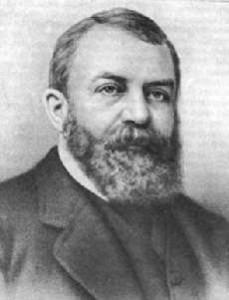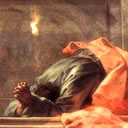Dwight L. Moody
D. L. Moody was undoubtedly one of the greatest evangelists of all time. The meetings held by Moody and Ira Sankey were among the greatest the world has ever known. They were the means under God of arousing the church to new life and activity, and were the means of sweeping tens of thousands of persons into the kingdom of God.
Mr. Moody was one of the weak instruments which God has to confound the mighty. Like Christmas Evans, he had very little education before his conversion to Christ. Atseventeen years of age he could scarcely read or write, and in a Bible class he could not turn to the book of John but searched for it in the Old Testament. After his conversion he became a proficient scholar. Few men have learned so much in the school of observation.
Dwight Lyman Moody was of old New England Puritan stock. For seven generations, or two hundred years, his ancestors lived the quiet lives of farmers in the Connecticut Valley. Moody inherited the vigorous constitution and hardy common sense of the typical New Englander. He was the sixth child in a family of nine children, and was born February 5, 1837, in the town of Northfield, Massachusetts, where he afterwards founded his famous Bible schools. His home town was always very dear to him, and it was one of the greatest pleasures of his life to return to it after a long and arduous evangelistic campaign.
Moody's father died at the early age of forty-one, and left his widow in poverty with a mortgage on the home and seven children to support. The creditors seized everything they could, even to the firewood, and the children had to stay in bed until schooltime to keep warm. A brother of the widowed mother then came to their rescue and helped to relieve their immediate needs. In their extremity Rev. Mr. Everett, the Unitarian minister, was very kind to them, and all the Moody children became members of his Sunday School, and were enlisted as workers to bring in other children. It was here, therefore, that young Moody began his successful career as a Sunday School worker. Moody's mother had sought to bring up her children as a Christian mother should and Dwight never wandered into gross sins as so many young men have done. Lying, complaining, breaking of promises, or talking evil about others, was never allowed in the home. One evening when the children had but little to eat, they divided their scant supply with a beggar. When Dwight was eight years of age, he and an elder brother were crossing the river in a skiff with a boatman who was too drunk to row the boat, and who would not let them touch the oars. They were drifting with the current, but Dwight urged his brother to trust in the Lord, and they came safely to land. Dwight was mischievous but not wicked as a boy. The Moody family was so poor that the boys would carry their shoes and stockings in their hands on their way to church, to save them from wear, and when in sight of the church would put them on. Dwight thought it hard, after working all week, to have to go to church and listen to a sermon he did not understand. Once the preacher had to send someone to the gallery to awaken him. But he got in such a habit of going that he could not stay away, and he afterwards said that he thanked his mother for making him go when he did not feel like going.
At ten years of age Dwight left home in company with another brother to work at a place about thirteen miles away. This nearly broke his mother's heart, as she had striven so hard to keep the family together. He was fondly attached to his mother and sorrowed over leaving her. When he arrived at the new place an aged man gave him a penny and bade him trust the Lord. "That old man's blessing has followed me for fifty years," said Mr. Moody.
At seventeen years of age, Moody, tired of farm life and ambitious to work his way upward in the world, decided to go to Boston. He arrived there without any money, and tried in vain to find work until he was almost in despair. He then found employment with an uncle who was in the shoe business. He succeeded well as a salesman, and became a regular attendant at the Mount Vernon Congregational Sunday School. Having but little schooling, he took but little part in the discussions in the class in Sunday School, but gradually became deeply interested in the study of the Bible, and finally took part in the discussions in the class. His teacher, Mr. Kimball, took great interest in him, and gradually led him to see the plan of salvation until all that was necessary was a personal interview to lead him to Christ. Mr. Kimball prayerfully sought for a proper time for this interview.
"I determined to speak to him about Christ and about his soul," says Mr. Kimball, "and started down to Holton's shoe store. When I was nearly there I began to wonder whether I ought to go in during business hours. I thought that possibly my call might embarrass the boy, and that when I went away the other clerks would ask who I was, and taunt him with my efforts in trying to make him a good boy. In the meantime I had passed the store, and discovering this, I determined to make a dash for it and have it over at once. I found Moody in the back part of the building wrapping up shoes. I went up to him at once, and putting my hand on his shoulder, I made what I afterward thought was a very weak plea for Christ. I don't know just what words I used, nor could Mr. Moody tell. I simply told him of Christ's love for him and the love Christ wanted in return. That was all there was. It seemed the young man was just ready for the light that then broke upon him, and there, in the back of the store in Boston, he gave himself and his life to Christ."
Moody's whole life was now changed, and became one of joyful Christian service. "Before my conversion," says he, "I worked towards the Cross, but since then I have worked from the Cross; then I worked to be saved, now I work because I am saved." Again, he says: "I remember the morning on which I came out of my room after I first trusted Christ. I think the sun shone a good deal brighter than it ever had before — I thought that it was just smiling upon me; and as I walked out on Boston Common and heard the birds singing in the trees, I thought they were all singing a song to me."
Moody was now running over with zeal and love for the Master, but he did not seem to have received much help and encouragement from the conservative deacons and church members in the church which he was attending. The next year after his conversion, he was denied church membership because he was "not sufficiently instructed in Christian doctrine." Three of the committee who examined him were appointed to instruct him in the way of God more perfectly.
In 1856, the second year after his conversion, Moody went to Chicago, where he united with the Plymouth Congregational Church and became a very active Christian worker, putting his soul and energy into the work of winning men to Christ. He rented a pew in the church, and filled it with young men every Sunday. Then he rented another and another until he had rented and filled four pews. The great revival awakened by Finney spread to Chicago, and Moody was in his element. Meanwhile he was prospering in his business, and was so good a salesman of shoes that his employer sent him out as a commercial traveler.
He found a little mission Sunday School in Chicago where they had sixteen teachers and only twelve scholars. Here he applied to become a teacher. They consented on condition that he would find his own scholars. This just suited his taste and next Sunday he arrived with eighteen little hoodlums which he had gathered from the streets. He soon had the building crowded. In the fall of 1858 he began another mission school on a larger scale in another part of the city. The large hall was soon overcrowded. He then procured a larger hall, which afterward developed into one of the leading churches of Chicago. This big hall he soon had filled with street "gamins." The children loved him and crowded in by the hundreds and sung the hymns with great enjoyment. Moody also enticed them in with prizes, free pony rides, picnics, candies, and other things dear to the hearts of children. Scholars were allowed to transfer to any class they desired by simply notifying the superintendent; and this plan resulted in the survival of the fittest teachers. The school soon numbered 1,500. Moody decided to build a church and issued certificates on the "North Market Sabbath School Association; capital $10,000; 40,000 shares at 25 cents each." The Sunday School grew to such proportions that parents were drawn in, and then meetings were held almost every night in the week. Many prominent men assisted Moody in the Sunday School and in the meetings, but so much devolved on him that he had sometimes to be both janitor and superintendent. This practical training contributed much to his success as a preacher. Doubtless he needed such training, as at first he seems to have spoken very awkwardly in public. When he first arose to speak in a prayer-meeting one of the deacons assured him that, in his opinion, he would serve God best by keeping still. Another critic, who praised Moody for his zeal in filling the pews at Plymouth Church, said that he should realize his limitations and not attempt to speak in public. "You make too many mistakes in grammar," said he. "I know I make mistakes," was the reply, "and I lack many things, but I'm doing the best I can with what I've got." He then paused, and looking at the man searchingly, inquired, in his own inimitable way, "Look, here, friend, you've got grammar enough — what are you doing with it for the Master?
Mr. Moody's great Sunday School work was accomplished before he was more than twenty-three years of age. With all his work for Christ he had no thought of entering the ministry until he found that souls were being led to Christ through his efforts. He then decided to give up the business in which he had been engaged, and in which he had already made over $7,000, and to devote all his time to Christian work.
~ Part 2 Next Month ~
 There is a voice of Truth which can be heard crying out! Whether lost or saved, we believe you will meet the living Christ through this ministry.
There is a voice of Truth which can be heard crying out! Whether lost or saved, we believe you will meet the living Christ through this ministry.